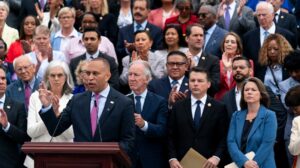
Tennessee has introduced a new law targeting bullying, which could see teens lose their driving privileges for up to a year if found guilty of such behavior. This measure is part of a broader initiative to curb bullying in schools. Meanwhile, significant developments are unfolding on the international stage and within the United States.
USAID Funding Cuts: A Global Impact
The dismantling of the US Agency for International Development (USAID), ordered by President Donald Trump, is having profound effects worldwide. The Department of Government Efficiency has enacted cuts that freeze or significantly reduce funding for thousands of foreign assistance programs. A recent study estimates that these cuts could lead to over 14 million additional deaths by 2030, with more than 4.5 million of those deaths expected to be children under five.
The authors of the study liken the potential impact of these cuts to that of a global pandemic or a major armed conflict. The decision to reduce USAID’s budget underscores a shift in US foreign policy priorities, focusing more on domestic issues.
Ukraine Munitions: A Strategic Pause
In a controversial move, the Trump administration has paused some shipments of weapons to Ukraine, including air defense missiles. This decision comes amid intensified Russian air attacks on Ukraine, utilizing hundreds of drones and missiles in near-nightly assaults. The US has been Ukraine’s largest military aid donor since Russia’s invasion in 2022. However, under President Trump, US support for Kyiv has shifted, with the administration citing “America’s interests first” as the reason for the pause.
White House Deputy Press Secretary Anna Kelly emphasized the need to reassess military aid priorities, sparking debate over the US’s role in international conflicts.
Trump’s Megabill: A Controversial Legislative Push
The Senate has passed President Trump’s sweeping domestic agenda bill, a move that could significantly reshape American fiscal policy. Vice President JD Vance cast the tie-breaking vote in the Senate, allowing the bill to advance. The legislation proposes increased funding for the Pentagon and border security, while downsizing safety-net programs like Medicaid. According to the Congressional Budget Office, the bill could add nearly $3.3 trillion to the deficit over a decade.
As the bill returns to the House, GOP leaders are eager to secure its approval before July 4. The bill has sparked intense debate over fiscal responsibility and the role of government spending.
Climate Change: Defunding Critical Research
The Trump administration’s proposed budget aims to eliminate climate-related research at NOAA, including defunding the Mauna Loa laboratory in Hawaii. Since the 1950s, this lab has provided crucial evidence of human-caused climate change. The budget proposal also targets other climate labs and the US government’s greenhouse gas monitoring network, which spans from Alaska to the South Pole.
Environmentalists and scientists warn that these cuts could severely hinder efforts to combat climate change and understand its impacts on global weather patterns and food systems.
Paramount Settlement: Legal and Corporate Implications
Paramount Global, the parent company of CBS News, has agreed to pay $16 million to settle a lawsuit filed by President Trump over a “60 Minutes” report. Although legal experts deemed the lawsuit frivolous, Paramount prioritized corporate interests over journalistic principles. The settlement comes as Paramount seeks approval for a merger with Skydance Media, a deal requiring Trump administration approval.
Shari Redstone, Paramount’s controlling shareholder, stands to gain significantly if the merger proceeds. Despite Paramount’s insistence that the lawsuit is unrelated to the merger, the settlement raises questions about the intersection of media, politics, and business.
As these stories unfold, they highlight the complex interplay of domestic policy, international relations, and corporate interests in shaping today’s global landscape.






